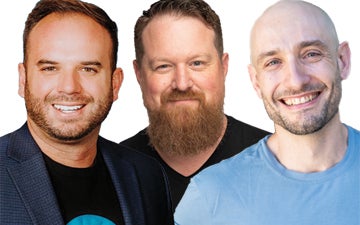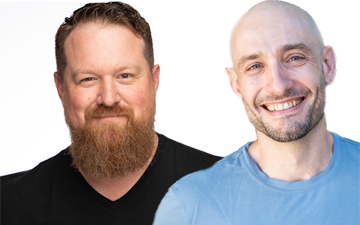Accounting 2030: Exploring the future of the profession

In part two of his chat with Chad Davis and Josh Zweig, co-founders of LiveCA, Ben Richmond of Xero discusses how CPA firms can meet the challenges to come
IN MY recent article, I spoke with Chad Davis and Josh Zweig, Co-Founders of LiveCA about lessons learned five years out from the onset of the COVID-19 pandemic. Now, we’re taking a look ahead at the next five years, to the year 2030, where the accounting profession will experience another fundamental transformation.
Technology, like artificial intelligence (AI), is changing how clients engage with accountants, how firms operate, and what it means to be a trusted advisor. Read on for part two of my discussion with LiveCA for advice on navigating the current economic climate while building for the future, how their firm is navigating change, and what they’re learning along the way.
Ben: What are the biggest changes facing the accounting profession in the next 5 years?
 |
Read part one of this two-part article, Five years post-Covid: Reflecting on accounting’s 'new normal,' with Chad Davis and Josh Zweig of LiveCA. |
Knowledge and insights, powered by AI. We fundamentally believe it’ll change the very fiber of all professional service businesses. Trust will become increasingly important as accountants sift through more data and more AI generated noise. Firms that focus on transparency, ethical AI use, and solid checks and balances on AI-produced information will naturally rise above the rest.
However, not every firm needs to become all things to all people using the latest AI by 2030. Many firms will succeed by choosing niche opportunities whether that’s in technical expertise, navigating regulations, recurring transactional responsibilities, high-level CFO advisory, or filling entirely new market gaps we can't even imagine yet. Firms don't have to offer everything just because they can.
In 2030, you'll still see accountants who prefer familiar tools alongside those diving into new tech. Clients will have plenty of options, but they'll have access to AI tools on their own that eliminate a lot of the work accountants do today. They’ll know more about what they want, making the the selection process of finding an accountant possibly more difficult if accountants don’t adapt to these consumer demands. As a result, accountants will see a massive opportunity to market themselves to their ideal customer.
Ben: What advice do you have when it comes to navigating economic uncertainty?
LiveCA: This is a time to be really clear on your vision, values and value proposition. In our case, we want to create a great work environment for our team members just as much as we want to positively impact our customers. That means that we move at a certain pace and may have higher prices from employing a full Canadian team. Not everyone is into that. But we’ve learned how enjoyable it is to work with both team members and customers that share the same vision. They’re out there. But it takes work to stay on track.
It feels like a very uncertain time right now for many businesses. It’s challenging to balance a high number of client deliverables, while at the same time bringing on new customers to replace those who have had to wind down their operations. It’s easy to get swept up in a wave of anxiety, and it can be tempting to bring on any type of customer to fill the void and bring in revenue, or lower your prices to retain a client. These practices often hurt firms in the long run as poor client relationships can lead to staff turnover and ultimately create a business you no longer want to be part of.
On the flip side, sticking to our vision and values means we get to work with highly engaged customers that refer us to other like-minded customers. As a result, we have highly engaged team members that refer our workplace to other like-minded team members. Both of which lead to a more sustainable profit margin.
Ben: Over the next five years, how can practices adapt to meet evolving client needs?
LiveCA: The key to meeting clients' needs is to evolve as a firm alongside them. For example, one of the biggest changes we made in our business is to our pricing model. For many years we stuck to a value pricing model which, while effective from the outset, meant that customers didn’t have much transparency into the price structure or feel in control of their scope with us. Moving to a budgeted hour model allows us to design a budget for a customer and give them control to increase or decrease their engagement with us, depending on changes within their business.
Designing such a model actually made it easier for us to leverage technology as we could explain to customers that if they used certain accounting software, payroll app or other add-on, we could actually save time which would reduce the price of their engagement. It is then easier to justify adding an app like A2X with Xero if the customer understands it will reduce their bookkeeping costs significantly.
The overall impact to our business with this kind of price transparency has allowed us to really feel like we’re working together with customers to tailor an engagement to their needs, rather than trying to upsell them on new services. It feels like we’re now much more aligned with our customers than ever before.
The future is bright, for those who build it
In 2030, the accounting profession won’t be defined by the technologies and digital tools we adopt, it will be defined by how we use them in practice and communicate their value. For example, more robust Client Advisory Services (CAS) offerings will foster partnerships with clients that are designed to last and prosper. LiveCA’s experience shows that firms that stick to their vision and mission, stay true to their values, and remain open to change have a lot to look forward to.
Ben Richmond is Managing Director, North America at Xero.
He is responsible for driving Xero’s growth in the United States and Canada. In 2013, he joined Xero as New Zealand sales director where he led the business' national growth and spearheaded Xero's global agriculture strategy. Prior to joining Xero, Ben worked in a large regional accounting practice before joining New Zealand's largest telecommunications company in a senior accounting role. He was also one of the founding board members of the Spark Foundation. Ben is a chartered accountant and earned a Bachelor of Commerce majoring in accounting, finance and information systems from the University of Canterbury.
Images courtesy LiveCA and Xero Canada.











(0) Comments